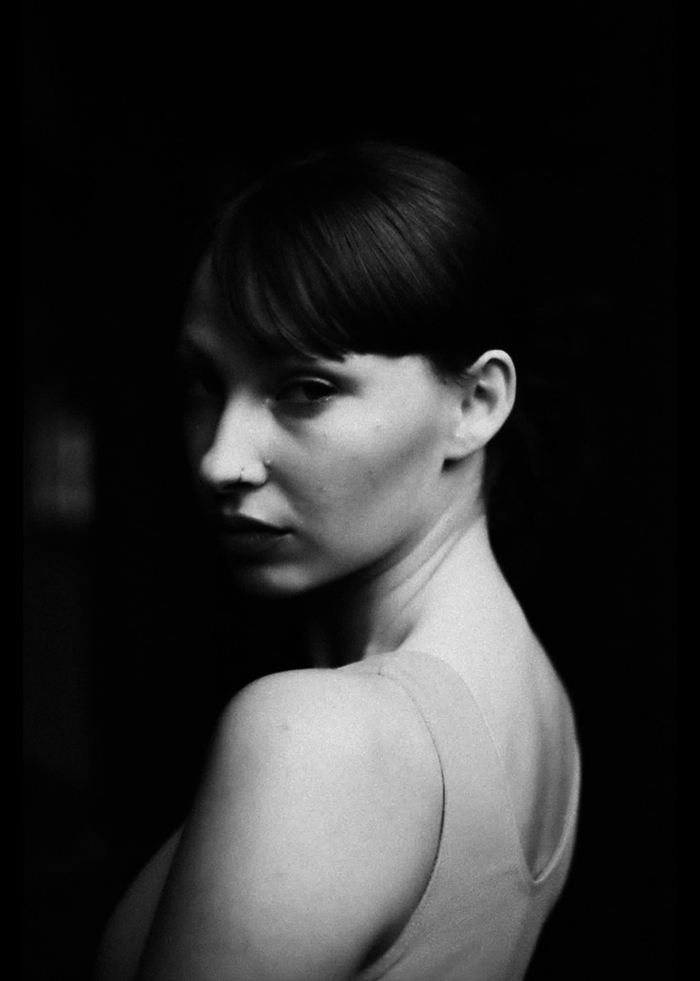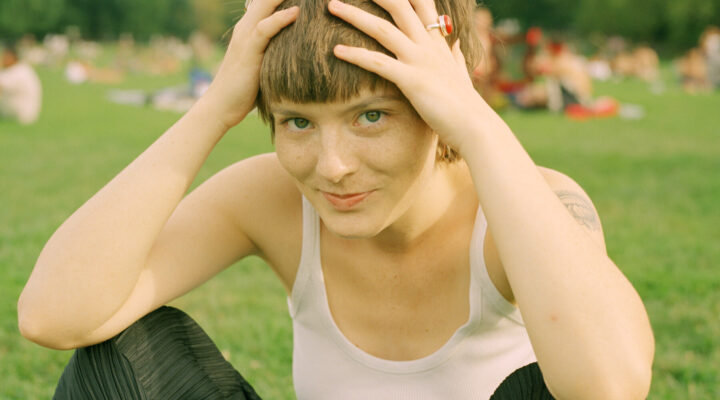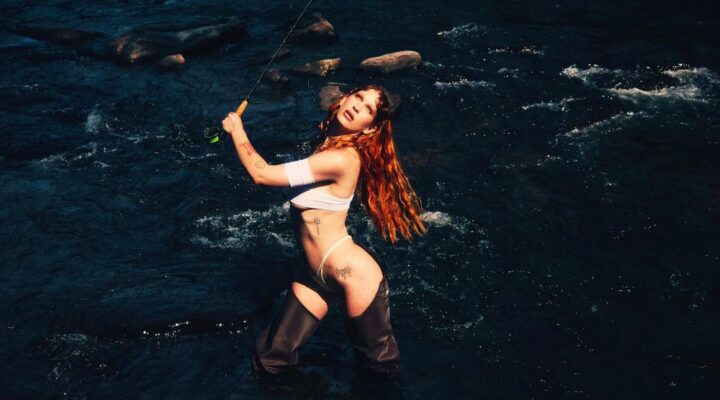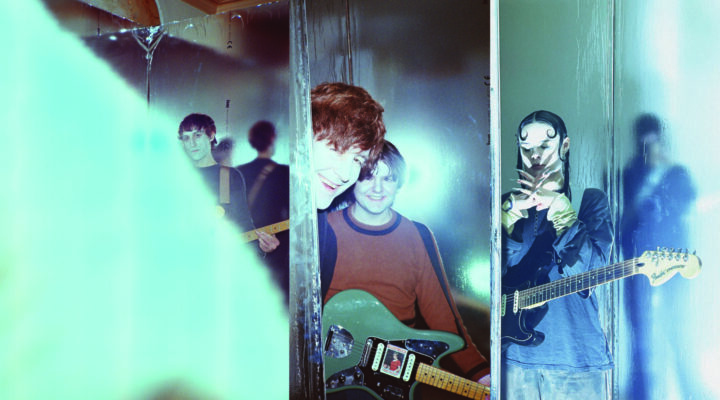An Interview with Bianca Scout
by Thierno Deme
Bianca Scout is a multi-faceted artist whose background in both dance and music has given her a unique perspective on the interconnectivity of these art forms. According to Scout, music and dance have the power to evoke vivid imagery and convey a range of emotions. In her performances, she seamlessly blends movement direction, layered vocals, and storytelling to create a multi-sensory experience that explores themes such as displacement, yearning, and memory. Throughout this interview, Scout discusses her artistic journey, including how attending an improvisational workshop in Amsterdam inspired her to explore the connection between music and movement. Scout also reflects on a childhood dream where she browsed through a video rental store to select her dreams for the night, and what this act of browsing means to her.
She will be performing in Amsterdam this Friday the 21st of April at De Nieuwe Anita. You can find more about the show here.
This interview is held in the context of Subbacultcha’s magazine, Sprout. Each issue of Sprout explores a theme. This one’s ‘browsing’. What does that word evoke to you?
Cinematic doors, a memory of a dream I had when I was in primary school. Well, kind of a dream… It’s more of a prelude to a dream. Young Scout working out how dream images correlate into the next sequence of events. Which in this case is sleep. I decided that closing my eyes would be like entering my local video rental store where each DVD box contains a different dream. I’m walking around the store and I can see my hand gently touching each DVD box, wondering what’s inside them, browsing. ‘What dream do you wanna have tonight?’ is the last thought I remember.
Can you tell us about your background in music and dance? How did you first get started in these creative fields? How do you balance these two creative outlets and find a cohesive expression through both mediums?
I started dance classes––ballet and contemporary––when I was four. It used to be my main form for everything. It gave rise to a sense of understanding both in and outside of my brain. I’m much better at expressing feelings through forms of movement than in words. But when I moved to London to attend dance school, I ended up dropping out in my third year. There seemed to be something lacking in the world I was in. I don’t like to do something if I’m not fully invested in it. I wasn’t into the idea of being part of a company anymore and performing choreography created by someone else who used our movements and ideas. So, I decided to take a year off and finish my training at another school. In that year, I started to make music. I actually remember the moment I felt this pang to sing more, which I think aided my switch from dance to music. A year before I dropped out, I attended a Katie Duck improvisation workshop in Amsterdam. Musicians were improvising from the dancers’ movement, and dancers were improvising to the musicians’ sound. A continuous liminal space between following and being led. There was one woman speaking and singing through a loop pedal. I felt this urge to join her. That’s how I wanted to sing. So, after that summer I got myself a loop pedal and my exploration of musical movement began. I don’t see dance and music as separate. They both create shape, form and imagery. You can see dance in music and music in dance.
Can you walk us through your creative process and how you approach making music?
Every time it is so different! I don’t really have a method––I start by jamming and just having the record button on at all times, to make sure I capture everything. Always press record at the start of your sessions! I forced myself to overcome any block you might have from being on the spot and just relax into it. Most of my work consists of layers upon layers of old sounds that I’ve saved over the years of making music as a form of procrastination. It’s amazing how you can take one song and make a million more out of it. The sounds you hear are not from any sample pack or plug-in––they are composed and manipulated in the space I am inhabiting at the moment of recording. Sometimes, I spend days, months, or even years working on a project, and everything is always evolving. It is quite rare to finish a song right in the moment, these methods can never be exactly replicated again. These recordings feel a bit like magic.
Your music has been described as being concerned with unlocking spiritual potential. Can you talk more about this theme in your work and how it influences your creative process?
It’s interesting that my music has been described this way. I do believe that music is spiritual whether you approach it with that intention. Spirituality is creative! To me, creativity and spirituality are really the same thing. I do like the word ‘unlocking’ in this context. I’m definitely doing that within myself when I make music, but I’m not trying to prise anything out of anyone. I do see chambers, gates, wells, blocks, drifts, and borders that are within and around us. Sound is a powerful force that can shift weight and transport us to different places. When I first started sharing my music, I was surprised by some of the reactions I received. While it felt normal to me, many people described it as a “trip” or “not easy listening music”. This wasn’t my intention. Perhaps this discomfort is part of the process of unlocking. As they say: the path to spiritual enlightenment is not always an easy one.
Your music spans a variety of genres, from ambient to experimental. How do you approach genre in your music, and do you feel like you fit into any particular scene or movement?
It is whatever the feeling is at the moment. I’ve noticed that many people in our age bracket have playlists that span from Gucci Mane to Nine Inch Nails. And it works well together! I’m not interested in approaching a specific genre, as I think it stifles what you have to offer. I think you should just have fun making sounds that make you want to orgasm, cry, or relax. I think most musicians I love don’t try to sound like anyone else. I will say though, that I do sense some kind of path in my brain of what it is I like to follow in terms of sound: heart strings in classical music, the devourment of grand ballet type shit, a fkkxxin subwoofer of trap music. I love the pianos in Silent Hill and the voices of women from the mountains. I’ve met so many incredible people who mix and match storytelling, film, movement, theatre, and music in such beautiful ways. Sometimes their music evolves or is best understood in other contexts, like a trail for a passenger to follow. I want to give a shout-out to some of the inspirational people I’ve met in London. Namely: Klein, Mica Levi, Coby Sey, Covco, The Narrator, Nwakke, Malik, and Elena Isolini.
Your new album The Heart of the Anchoress has been described as a blend of hypnagogic aether-pop, after-hours ambience, and chopped-n-screwed sacred music. Can you talk about the inspiration behind this unique blend of sounds and how it came together on the album?
The main inspiration was the organ, and all of the different kinds of sounds you can get from it. Its banging and creaking became the beat of my playing, and the instrument itself feels like a whole band. One shift and you have knocked the pedals, or the wood panelling which automatically creates so much texture in the moment. I then would sample something that would make my head nod. I like the idea of my music being in this ‘empty space’––like a hidden well or sunken place––that acts like a portal to a city bar or some place in your mind where the music is still ringing in your ears, hours later, when you’re lying in bed, falling asleep.
The album was recorded in Camberwell’s St. Giles’ Church and features the church’s famous pipe organ. How did the setting and instrumentation influence the sound of the album?
There wouldn’t have even been an album without that organ. After I played on it I expressed my desire to make an entire piece centred around it. The guys on First Terrace were really into the idea. I love playing on organs because of the sound of air shooting through wood or pine or steel or any other material. It’s fun to chase the sounds that are in your head, and combine them with things outside of yourself. How the record evolved is not at all how I expected it to turn out. But I never really know what to expect; the best sounds I’ve made are always done completely by accident.
How does your English background influence you as an artist?
This is an ongoing question for me. I grew up in Newcastle, which is close to the sea, forests, lakes and mountains. Mountains are my favourite. There’s a proper folky vibe in Newcastle, as well as the best ‘stag party and hen do’ night out atmosphere in the city centre. There’s many generations partying and dressing up. It’s pretty grimy sometimes, but I love that. There’s just lots of singing and shouting everywhere––like in the pubs in Ouseburn or taxis full of people going out. Many inches of who I am come from everyone around me. I think you can hear this in the music.
I watched a lot of Black Adder and Monty Python growing up. I think that sums up a lot of my English humour and writing. I’m often parodying this kind of old man, pompous philosopher that really doesn’t have a clue. This, to me, is related very much to the darkness here. Darkness in a mythical sense but also in a very real colonial aspect where the ideas of what and how we should be, that being ‘moral’, is the way we should act. The history of forcing others into these ideas and ways of being, but then also erasing that history simultaneously. To me, this creates a kind of ‘memory fog’; a disconnection. Recording organs in this super glittery church made me think about the idea of upholding this system of ‘what god intended’. Who is anyone to make this your reality? I don’t blame god, I blame the humans who twist and manipulate the ideas. Those feelings were channelled into the composition and writing of the music.
Can you discuss what went into creating the larger narrative of the album?
The words you are hearing are written from the perspective of the origins of the virgin bride as a manipulated structure. I’ve been working on this narrative since the beginning of lockdown. There’s no explicit mention of her and I don’t consider myself to be playing the role of the anchoress. I don’t even think the bride in my story knows about the anchoress yet. However, they relate to each other in my quest. There is a storyline, but the album is not a musical or a play. It’s more like an exorcism of something.
The lines “God is a loose spirit… loose spirit cannot be controlled… love will not take away space, empty space is not lonely… nothing is ever still or ceases to exist… nothing rests… I just want you to know me better” are the sad longings of the origin bride. She had a terrible curse put upon her by a cheeky essence, but then gets loads of fun being a half-phantom in a new domain. The Heart of the Anchoress is about the death of a sense of self, contrived and manipulated by the state, my faith, my ex lovers or institutionalised propaganda. I love the origin bride, she’s the unknown underdog of my inner being. I can’t wait for season 7.
The album explores themes of melancholy, euphoria, anger, and ecstasy. Can you discuss how these emotions are reflected in the sound and lyrical content of the album?
There seems to be a tension between sweetness and precarity, which we often try to work out in life. I find myself drawn to chords and sounds that harmonise between different places, like empty space. When I discovered a particular chord on the organ, I knew it would be the foundation for an entire song. Around that time, I had been compiling a story in my own way––based on themes relating to church and my discomfort as a faithful person who couldn’t fully embrace Christian ideas and practices. I still have these ideas inside me, hungry to be expressed, so the sound of the album has a certain anguish to it. The Mortal Instrument of Bones was my working title, because it felt like a wooden, creaky lung breathing in and out.
The Heart of the Anchoress has this ability to capture a contemporary mood while also channeling spirits of the past. Can you discuss how the album strikes a balance between these two elements?
I think that’s really a Bianca Scout thing––a theme present in all of my work. Are spirits ever really in the past? A spirit can appear anywhere, at all times. We are contemporary and I’m not interested in upholding anything from the past. I don’t believe our values were any better, or have gotten better. For me, being “of the now” means being interested in these spirits and uncovering what’s hidden in them, in the present moment.
What’s next for you in terms of your creative output and performances?
At the moment I am working on various projects including books, a PlayStation game, an interactive role-play experience, and 7 other albums. As for performances, I’m just letting whatever the focus is at the time guide how I’ll enter the stage and witness it with you. The next record will come out around May. It’s called PATTERN DAMAGE, released by sferic. The album will have a ‘pattern ballet’ performance to accompany the music. Also, I have a collaborative project with my good friend Martyn, called MARINA ZISPIN. We will release an EP after summer.
She will be performing in Amsterdam this Friday the 21st of April at De Nieuwe Anita. You can find more about the show here.






